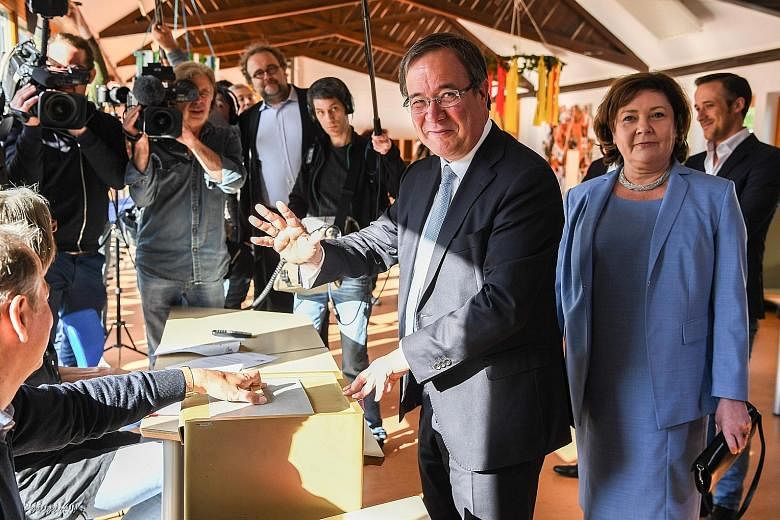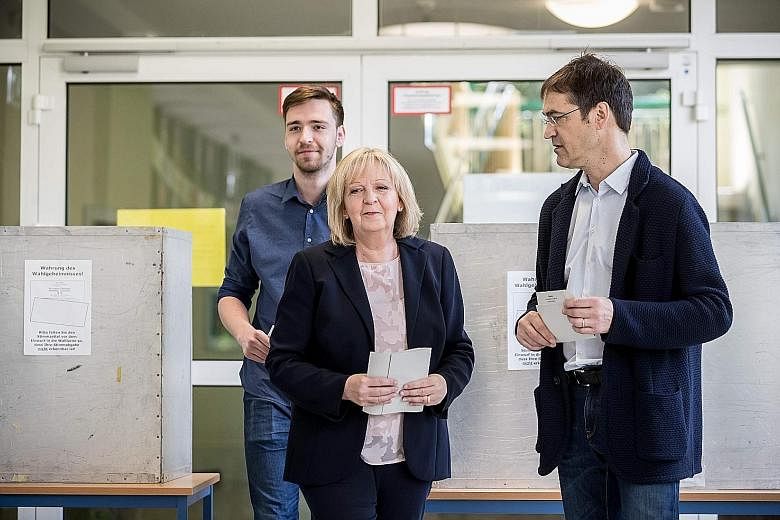BERLIN • German Chancellor Angela Merkel's conservatives scored a major upset in a key state election yesterday, finishing ahead of the ruling Social Democratic Party (SPD) and boosting their hopes of retaining power in September's federal vote.
The Christian Democrats (CDU) saw a strong surge of support in Germany's most populous state of North Rhine-Westphalia, where the SPD has ruled for most of the post-war years.
The CDU won 34.5 per cent, up from 26.3 per cent in 2012, according to an exit poll on public broadcaster ARD just after polls closed.
The SPD fell to 30.5 per cent from 39.1 per cent. It was the third straight state defeat for the SPD since March, casting a shadow over their once bright hopes of denying Dr Merkel a fourth four-year term on Sept 24.
The outcome was the latest indication that initial enthusiasm for the new SPD leader, Mr Martin Schulz, could be fizzling out.
The SPD had been ailing nationwide but saw a surge in support in February, when Mr Schulz took over. But that failed to translate into votes in the last two state elections, when the CDU won comfortably.
After casting his vote in his hometown of Wuerselen, Mr Schulz acknowledged yesterday that the race would be close, with 30 per cent of voters deciding their pick at the last minute. "That makes it thrilling to the last second. I hope, of course, that we will be ahead in the evening," he said.
An election in Germany's biggest state is always significant, but it carries higher stakes this year, being the last regional vote before national polls and having a direct impact on whether the SPD can close the gap nationwide with the CDU.
"There is a real chance that we can win. Now it's time for the voters to decide," said CDU candidate Armin Laschet in remarks carried by national news agency DPA.
In the run-up to yesterday's vote, Mr Schulz had held more than 30 rallies in the state, where he began his political career in Wuerselen.
The party is banking its hopes on incumbent state premier Hannelore Kraft, 55, who secured 39.1 per cent in a 2012 vote, while the CDU clinched just over 26 per cent.
"If Kraft succeeds, then the chances of the SPD's bid to take back the chancellery grow. If she loses, it would mean that the Schulz train has slammed against a wall," the weekly Spiegel magazine said.
Political analyst Oskar Niedermayer also noted the state's significance to the SPD, noting that "a defeat there would be a disastrous symbol" for the party.
Mr Schulz is hoping that his push for "social justice" will resonate in North Rhine-Westphalia, which has lagged behind western Germany economically.
He argues that many people are struggling in temporary or low-paid jobs even though the country as a whole is growing richer.
But Dr Merkel has also been pounding the streets in the state of 18 million people, including 4.2 million of migrant origin.
In Haltern am See last Wednesday, she took aim at Mr Schulz's arguments, saying the CDU offers "justice in the sense of jobs, strong budgets, funds for local communities".
She also urged voters to look at her government's economic record - with 7.5 per cent unemployment, the state fares worse than the national rate of 5.8 per cent, she said.
Mindful that local issues can tip the balance, Dr Merkel has also blamed the incumbents for persistent traffic jams that "are longer than from here to the moon".
The populist AfD (Alternative for Germany), which has railed against a migration influx, hopes to win its first seats in North Rhine-Westphalia, which would give it seats in 13 of 16 state parliaments.
REUTERS, AGENCE FRANCE-PRESSE


